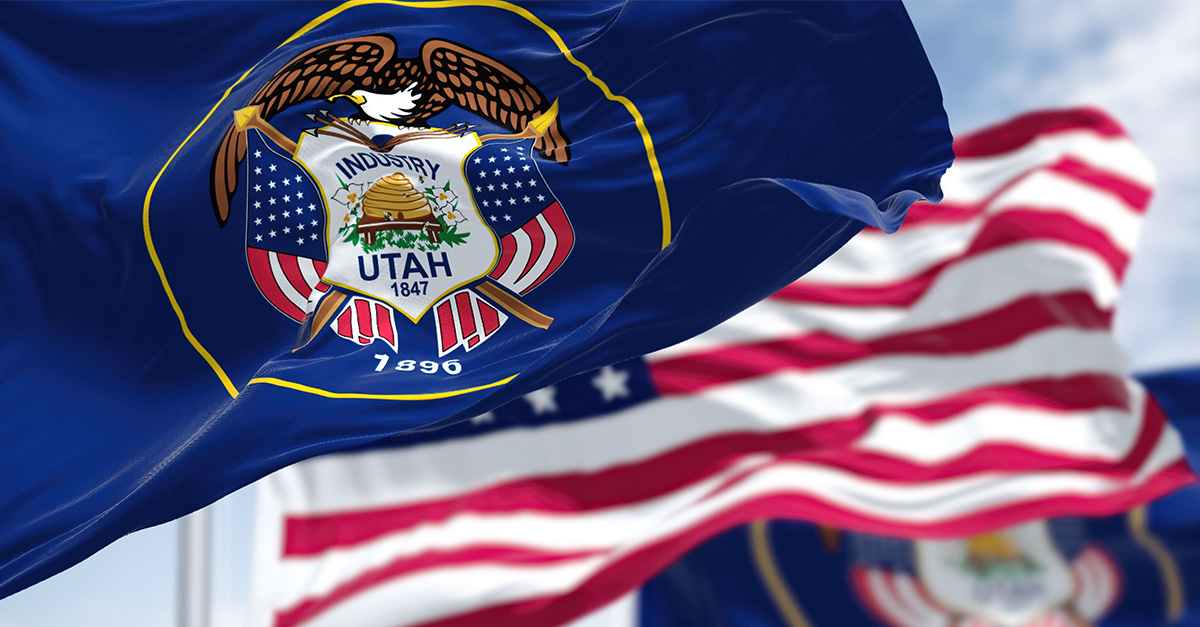


Get a free copy of Parental Rights & Education when you subscribe to our newsletter!

Set to take effect in early May, the new law effectively removes government institutions from the front lines of the culture wars by restricting flag displays to only those associated with shared American, community, and civic values.
Utah House Bill 77 (HB77), a new law prohibiting the display of overtly political or ideological flags in government buildings and public schools, will go into effect next month.
Utah’s Republican-controlled legislature recently passed the bill and it became law without Gov. Spencer Cox’s signature. While the governor expressed some concern about the bill’s reach into municipal governance, he ultimately allowed it to take effect, recognizing the legislature’s strong support for the measure.
“I deeply believe that our classrooms need to be a place where everyone feels welcome — free from the politics fracturing our country,” he wrote. “Parents are rightly upset when they bring their kids to publicly funded schools and see culture-war symbols in a place that should be apolitical.”
The bill received veto-proof support along largely partisan lines, passing the House of Representatives with a 49-20 vote and the Utah Senate with a 21-8 vote.
Set to take effect on May 7, the law mandates that government entities and public school employees refrain from displaying flags that are not explicitly authorized. Permissible flags include the United States flag; the Utah state flag; flags of other countries, states, municipalities, and Native American tribes; flags of the branches of the military and the POW-MIA flag; and those representing colleges or universities.
Proponents of the law say that this carefully curated list aims to ensure that only symbols representing shared identity, history, and civic pride are displayed rather than symbols tied to contemporary political movements or social ideologies. The goal is not to stifle dialogue but to maintain an atmosphere of neutrality and professionalism.
The legislation assigns the state auditor responsibility for investigating alleged violations and provides institutions with a 30-day compliance window. Non-compliance results in a fine of $500 per day. The enforcement mechanism ensures accountability while allowing institutions to make appropriate changes without undue punishment.
The new law does not interfere with private citizens’ rights to express themselves outside the realm of government and public education. HB77 also does not ban political flags on private property, during public protests, or in personal settings. Instead, lawmakers say that it draws a line between individual expression and institutional endorsement.
Utah’s move comes in the broader context of national concern over politicization in schools and public offices. Parents, teachers, and taxpayers nationwide have questioned whether classrooms should promote ideological causes, particularly when such causes are not universally agreed upon..
Already, lawmakers in states like Idaho and others are considering similar measures.
These efforts are the direct result of the U.S. Supreme Court’s unanimous ruling in Shurtleff v. City of Boston, wherein they determined that the city of Boston had violated the free speech and religious liberty rights of Camp Constitution, a Christian civic organization. The case arose when Boston denied Camp Constitution’s request to raise the Christian flag on a City Hall flagpole, despite previously approving all 284 applications from various groups, including those representing LGBTQ pride and communist countries.
In delivering the Court’s opinion, Justice Stephen Breyer emphasized that by inviting outside groups to communicate messages on government property, Boston violated the neutrality principle when it denied the flag of one group based solely on its religious nature, constituting viewpoint discrimination.
In response to this ruling, a ballot amendment was put forward in Huntington Beach, California, restricting the display of flags on public property to only the U.S., California, county, city, POW-MIA, and six Armed Forces flags; over 58 percent of voters approved the amendment in March 2024.
Mayor Gracey Van Der Mark and other proponents argued that the policy promotes unity by avoiding government endorsement of special interests.
Similar measures have also been enacted in Hamtramck, Michigan; Cold Spring, New York; and Enfield, Connecticut.

The recent passage of Utah’s HB77 is not controversial — it’s constitutionally grounded and consistent with Supreme Court precedent. In Shurtleff, the Supreme Court ruled unanimously that the government cannot open a forum for ideological expression and then pick and choose which viewpoints are allowed.
If a city or school district permits one group to raise an ideological flag, it must allow all others to do the same, including religious or politically conservative groups. The only way to avoid this constitutional dilemma is to restrict ideological messaging altogether in government spaces. Utah’s law does precisely that — and that’s what makes it not just permissible but prudent.
HB77 ensures that government buildings and public schools remain neutral and focused on serving all citizens equally. It restricts flags to those representing shared civic values — such as the American flag, state flags, and military banners — rather than divisive political symbols.
Far from being an act of censorship, this law prevents government spaces from becoming battlegrounds for partisan or cultural messaging. No group is singled out or targeted — everyone is subject to the same neutral standard.
There’s also a practical benefit. Without clear guidelines like HB77, cities and schools are left in a no-win situation: If they allow one group’s flag, they risk being forced to allow all others, but if they deny any requests, they could face lawsuits for discrimination.
Utah has chosen the fairest and legally safest path by setting a neutral standard for all public displays.
There is no constitutional right to have a personal ideology endorsed by the government. What HB77 protects is the right of every citizen to enter a classroom or city building without feeling that the institution itself is taking sides. That kind of neutrality is the bedrock of a healthy, pluralistic society.
Utah’s law isn’t radical, it’s responsible. HB77 allows for common sense and constitutional clarity. In a world of political noise, Utah chooses silence — not to stifle voices but to ensure that public institutions serve everyone equally. There is no controversy here, only a reaffirmation of the principle that government spaces belong to all of us.
If you like this article and other content that helps you apply a biblical worldview to today’s politics and culture, consider making a donation here.

Notifications